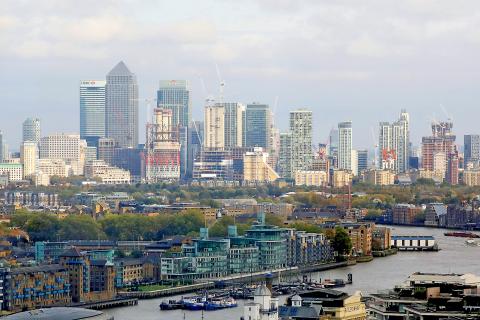Deutsche Bank AG and UniCredit SpA last month moved some of their swaps trades from London to Frankfurt, Germany, as banks used a lull in the ongoing Brexit drama to prepare for the worst.
About 10 banks took part in a switching run, in which lenders closed existing swaps positions in the UK and opened equivalent ones in Germany, people familiar with the matter said.
Some of the banks, including JPMorgan Chase & Co and Commerzbank AG, acted as market makers, treating the exercise as an opportunity to generate revenue by trading with the banks.

Photo: Reuters
Continental European banks would be unable to keep their swaps — a widely used type of derivative — in London from April next year if the UK leaves the EU without a deal.
That could force the banks to move trillions of US dollars of derivatives from LCH Ltd, a unit of London Stock Exchange Group PLC (LSE), to Frankfurt’s Eurex Clearing, part of Deutsche Boerse AG.
As well as helping Deutsche Boerse at the expense of LSE, such a move would erode London’s dominance as Europe’s financial center — and potentially roil the market for interest-rate swaps.
Deutsche Bank and UniCredit declined to comment, as did spokespeople for JPMorgan and Commerzbank.
Bayerische Landesbank, which also shifted some swaps to Frankfurt, and the Bank of England, LCH’s primary regulator, also declined to comment.
LCH holds more than 100 billion euros (US$111 billion) of cash and bonds on behalf of banks and fund managers seeking to protect their swap trades against the possibility that a major trading firm will default.
The European Commission saved LCH from having to kick out its EU-based clients at the end of last year, when it extended the London-based clearing house’s right to provide services to continental firms until the end of March next year.
Banks can continue to buy and sell LCH-branded swaps even if the UK leaves the EU without a deal at the end of October — the current scheduled date for Brexit.
Unless the commission further extends LCH’s ability to serve EU banks, those firms would have to move their swaps positions somewhere else before April next year.

CHIP WAR: Tariffs on Taiwanese chips would prompt companies to move their factories, but not necessarily to the US, unleashing a ‘global cross-sector tariff war’ US President Donald Trump would “shoot himself in the foot” if he follows through on his recent pledge to impose higher tariffs on Taiwanese and other foreign semiconductors entering the US, analysts said. Trump’s plans to raise tariffs on chips manufactured in Taiwan to as high as 100 percent would backfire, macroeconomist Henry Wu (吳嘉隆) said. He would “shoot himself in the foot,” Wu said on Saturday, as such economic measures would lead Taiwanese chip suppliers to pass on additional costs to their US clients and consumers, and ultimately cause another wave of inflation. Trump has claimed that Taiwan took up to

A start-up in Mexico is trying to help get a handle on one coastal city’s plastic waste problem by converting it into gasoline, diesel and other fuels. With less than 10 percent of the world’s plastics being recycled, Petgas’ idea is that rather than letting discarded plastic become waste, it can become productive again as fuel. Petgas developed a machine in the port city of Boca del Rio that uses pyrolysis, a thermodynamic process that heats plastics in the absence of oxygen, breaking it down to produce gasoline, diesel, kerosene, paraffin and coke. Petgas chief technology officer Carlos Parraguirre Diaz said that in

Japan intends to closely monitor the impact on its currency of US President Donald Trump’s new tariffs and is worried about the international fallout from the trade imposts, Japanese Minister of Finance Katsunobu Kato said. “We need to carefully see how the exchange rate and other factors will be affected and what form US monetary policy will take in the future,” Kato said yesterday in an interview with Fuji Television. Japan is very concerned about how the tariffs might impact the global economy, he added. Kato spoke as nations and firms brace for potential repercussions after Trump unleashed the first salvo of

SUBSIDIES: The nominee for commerce secretary indicated the Trump administration wants to put its stamp on the plan, but not unravel it entirely US President Donald Trump’s pick to lead the agency in charge of a US$52 billion semiconductor subsidy program declined to give it unqualified support, raising questions about the disbursement of funds to companies like Intel Corp and Taiwan Semiconductor Manufacturing Co (台積電). “I can’t say that I can honor something I haven’t read,” Howard Lutnick, Trump’s nominee for commerce secretary, said of the binding CHIPS and Science Act awards in a confirmation hearing on Wednesday. “To the extent monies have been disbursed, I would commit to rigorously enforcing documents that have been signed by those companies to make sure we get